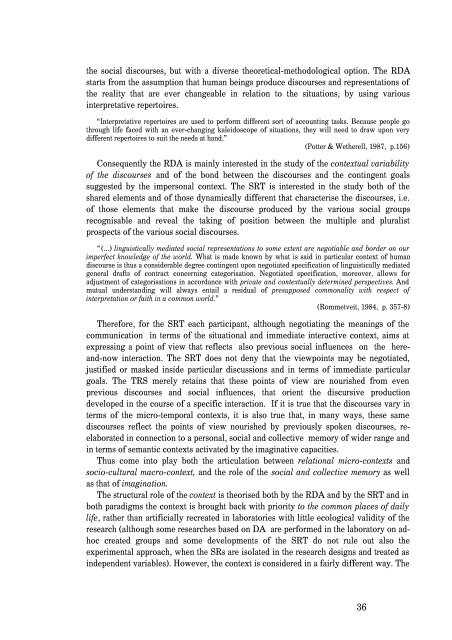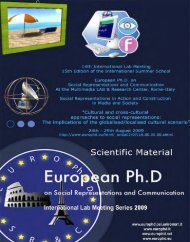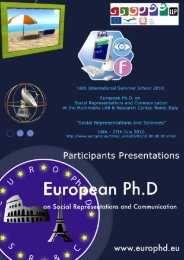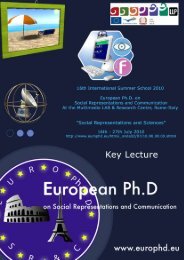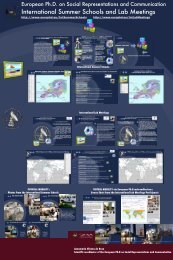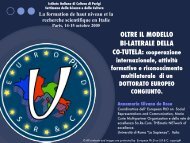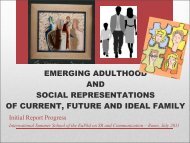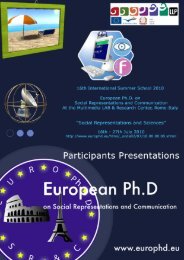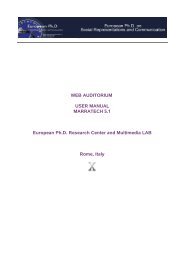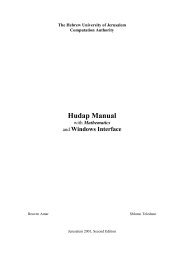The "boomerang" effect of the radicalism in discourse analysis
The "boomerang" effect of the radicalism in discourse analysis
The "boomerang" effect of the radicalism in discourse analysis
Create successful ePaper yourself
Turn your PDF publications into a flip-book with our unique Google optimized e-Paper software.
<strong>the</strong> social <strong>discourse</strong>s, but with a diverse <strong>the</strong>oretical-methodological option. <strong>The</strong> RDA<br />
starts from <strong>the</strong> assumption that human be<strong>in</strong>gs produce <strong>discourse</strong>s and representations <strong>of</strong><br />
<strong>the</strong> reality that are ever changeable <strong>in</strong> relation to <strong>the</strong> situations, by us<strong>in</strong>g various<br />
<strong>in</strong>terpretative repertoires.<br />
“Interpretative repertoires are used to perform different sort <strong>of</strong> account<strong>in</strong>g tasks. Because people go<br />
through life faced with an ever-chang<strong>in</strong>g kaleidoscope <strong>of</strong> situations, <strong>the</strong>y will need to draw upon very<br />
different repertoires to suit <strong>the</strong> needs at hand.”<br />
(Potter & We<strong>the</strong>rell, 1987, p.156)<br />
Consequently <strong>the</strong> RDA is ma<strong>in</strong>ly <strong>in</strong>terested <strong>in</strong> <strong>the</strong> study <strong>of</strong> <strong>the</strong> contextual variability<br />
<strong>of</strong> <strong>the</strong> <strong>discourse</strong>s and <strong>of</strong> <strong>the</strong> bond between <strong>the</strong> <strong>discourse</strong>s and <strong>the</strong> cont<strong>in</strong>gent goals<br />
suggested by <strong>the</strong> impersonal context. <strong>The</strong> SRT is <strong>in</strong>terested <strong>in</strong> <strong>the</strong> study both <strong>of</strong> <strong>the</strong><br />
shared elements and <strong>of</strong> those dynamically different that characterise <strong>the</strong> <strong>discourse</strong>s, i.e.<br />
<strong>of</strong> those elements that make <strong>the</strong> <strong>discourse</strong> produced by <strong>the</strong> various social groups<br />
recognisable and reveal <strong>the</strong> tak<strong>in</strong>g <strong>of</strong> position between <strong>the</strong> multiple and pluralist<br />
prospects <strong>of</strong> <strong>the</strong> various social <strong>discourse</strong>s.<br />
“(...) l<strong>in</strong>guistically mediated social representations to some extent are negotiable and border on our<br />
imperfect knowledge <strong>of</strong> <strong>the</strong> world. What is made known by what is said <strong>in</strong> particular context <strong>of</strong> human<br />
<strong>discourse</strong> is thus a considerable degree cont<strong>in</strong>gent upon negotiated specification <strong>of</strong> l<strong>in</strong>guistically mediated<br />
general drafts <strong>of</strong> contract concern<strong>in</strong>g categorisation. Negotiated specification, moreover, allows for<br />
adjustment <strong>of</strong> categorisations <strong>in</strong> accordance with private and contextually determ<strong>in</strong>ed perspectives. And<br />
mutual understand<strong>in</strong>g will always entail a residual <strong>of</strong> presupposed commonality with respect <strong>of</strong><br />
<strong>in</strong>terpretation or faith <strong>in</strong> a common world.”<br />
(Rommetveit, 1984, p. 357-8)<br />
<strong>The</strong>refore, for <strong>the</strong> SRT each participant, although negotiat<strong>in</strong>g <strong>the</strong> mean<strong>in</strong>gs <strong>of</strong> <strong>the</strong><br />
communication <strong>in</strong> terms <strong>of</strong> <strong>the</strong> situational and immediate <strong>in</strong>teractive context, aims at<br />
express<strong>in</strong>g a po<strong>in</strong>t <strong>of</strong> view that reflects also previous social <strong>in</strong>fluences on <strong>the</strong> hereand-now<br />
<strong>in</strong>teraction. <strong>The</strong> SRT does not deny that <strong>the</strong> viewpo<strong>in</strong>ts may be negotiated,<br />
justified or masked <strong>in</strong>side particular discussions and <strong>in</strong> terms <strong>of</strong> immediate particular<br />
goals. <strong>The</strong> TRS merely reta<strong>in</strong>s that <strong>the</strong>se po<strong>in</strong>ts <strong>of</strong> view are nourished from even<br />
previous <strong>discourse</strong>s and social <strong>in</strong>fluences, that orient <strong>the</strong> discursive production<br />
developed <strong>in</strong> <strong>the</strong> course <strong>of</strong> a specific <strong>in</strong>teraction. If it is true that <strong>the</strong> <strong>discourse</strong>s vary <strong>in</strong><br />
terms <strong>of</strong> <strong>the</strong> micro-temporal contexts, it is also true that, <strong>in</strong> many ways, <strong>the</strong>se same<br />
<strong>discourse</strong>s reflect <strong>the</strong> po<strong>in</strong>ts <strong>of</strong> view nourished by previously spoken <strong>discourse</strong>s, reelaborated<br />
<strong>in</strong> connection to a personal, social and collective memory <strong>of</strong> wider range and<br />
<strong>in</strong> terms <strong>of</strong> semantic contexts activated by <strong>the</strong> imag<strong>in</strong>ative capacities.<br />
Thus come <strong>in</strong>to play both <strong>the</strong> articulation between relational micro-contexts and<br />
socio-cultural macro-context, and <strong>the</strong> role <strong>of</strong> <strong>the</strong> social and collective memory as well<br />
as that <strong>of</strong> imag<strong>in</strong>ation.<br />
<strong>The</strong> structural role <strong>of</strong> <strong>the</strong> context is <strong>the</strong>orised both by <strong>the</strong> RDA and by <strong>the</strong> SRT and <strong>in</strong><br />
both paradigms <strong>the</strong> context is brought back with priority to <strong>the</strong> common places <strong>of</strong> daily<br />
life, ra<strong>the</strong>r than artificially recreated <strong>in</strong> laboratories with little ecological validity <strong>of</strong> <strong>the</strong><br />
research (although some researches based on DA are performed <strong>in</strong> <strong>the</strong> laboratory on adhoc<br />
created groups and some developments <strong>of</strong> <strong>the</strong> SRT do not rule out also <strong>the</strong><br />
experimental approach, when <strong>the</strong> SRs are isolated <strong>in</strong> <strong>the</strong> research designs and treated as<br />
<strong>in</strong>dependent variables). However, <strong>the</strong> context is considered <strong>in</strong> a fairly different way. <strong>The</strong><br />
36


